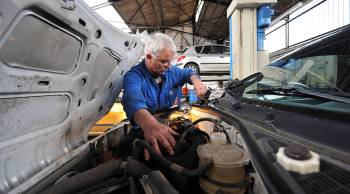Unemployment: Cyclical or structural?
TEXT OF INTERVIEW
BILL RADKE: The government’s monthly employment report comes out tomorrow. And it doesn’t look like our unemployment rate will come down then, or any time soon. But will it come down eventually and how will that happen? Economists are debating exactly that question, says Marketplace’s economics editor Chris Farrell. Good morning, Chris.
CHRIS FARRELL: Good morning.
RADKE: So I know the more liberal economists, the Paul Krugman’s of the world, have been saying the government should spend more to bring back jobs.
FARRELL: Well that’s right. They’re saying this unemployment is cyclical. Now that’s a fancy term for this dynamic — the economy’s weak, employees aren’t hiring; if the government can stimulate the economy, the economy really starts growing, then employers will hire workers, the unemployment rate will fall. But here’s the thing, Bill. There’s some really respected economists, they’re saying, “No, no no. Hold on. This high unemployment isn’t cyclical, it’s structural.”
RADKE: Yeah, structural. What do they mean by that?
FARRELL: What they mean is companies have jobs, but they can’t find the skilled workers they need. The workers want to work, but they don’t have the skills to get the job. So think laid-off construction worker, Silicon Valley firm hiring programmers.
RADKE: So which is it, Chris — cyclical or structural? And why is that so important?
FARRELL: Look, it’s both and I mean that very seriously. On the one hand, this economy is very weak and therefore, if it starts growing, the unemployment rate will start coming down. But there’s also a fundamental problem in our economy, Bill. That is we have too many poorly educated workers for the kind of jobs that are being created. But here’s the other thing. I want to just add one other twist: The real worry is the longer this economy grows slowly, the more structural unemployment will become.
RADKE: And why is that? What happens to jobs and to workers in a long economic slump?
FARRELL: Look, life is not fair. But what happens is you become rusty. You fall behind changes in your industry. And employers? They start looking at the unemployed workers’ damaged goods and it feeds on itself. And it is bad for everyone.
RADKE: OK. On that cheery note, thank you for laying that out for us. Chris Farrell, our economics editor, we appreciate it.
FARRELL: Thanks, Bill.
There’s a lot happening in the world. Through it all, Marketplace is here for you.
You rely on Marketplace to break down the world’s events and tell you how it affects you in a fact-based, approachable way. We rely on your financial support to keep making that possible.
Your donation today powers the independent journalism that you rely on. For just $5/month, you can help sustain Marketplace so we can keep reporting on the things that matter to you.


















